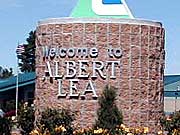Former Farmland workers still struggling
June 30, 2004
 |
| Former Farmland worker Mike Lee has found a new job, and has just graduated from the local community college with a degree in industrial maintenance. (MPR Photo/Jeff Jones) |
Albert Lea, Minn. — The fire that put the town's largest employer out of business is still fresh in people's memories, especially those who worked at the Farmland meatpacking plant.
"It was kind of a shock," says Mike Lee, a longtime worker at Farmland. "They has just stuck about $30 million into remodeling the place {the Farmland Foods factory}, and they were getting close to getting it finished up. So when it burned down, everyone was just in a daze for a little while."
Lee has lived in this area all his life. He worked at the Farmland pork plant through its various ownerships for 25 years. At one time or another he held just about every job there is on the production line -- from killing hogs to slicing for bacon. It was smelly and physically exhausting work, but Lee, a robust and big man, liked it.
 | |||
"They come out of the kill and they come out of the coolers, and then you clean them up," Lee describes the process. "Loins come out. Your ribs come out. You cut the hams off, pull out the tenderloins, cut them up in quarters and send them down the line. Then they go down to another spot where they pack stuff up."
That meatpacking job paid enough for Mike Lee to buy a small piece of land next to Lake Albert Lea, and build a modest house. On a recent morning, Lee sat at the picnic table in his backyard and talked about how he and others fared after losing their jobs.
Lee was out of work for a few months. He thought about moving to the Twin Cities. It would have been easier to find a new job there, he says, but he just couldn't do it. Ties to family and friends in Albert Lea kept him from seriously exploring that option.
Instead, Lee got by on temporary employment and eventually got a permanent job. He's working in a totally different field, making less money to start with.
"I work as a residential instructor. I work with the mentally challenged in a group home setting," Lee says. "I basically just help them with their daily lives. Make sure they get their meds and stuff on time. Make sure they get to work. Make sure they get their tasks done for the day, like make sure they get their laundry done. Just help them with their daily lives."
Lee says right now he's making a little bit less than he was at Farmland, but he might be promoted soon, which would mean a raise.
|
Some of them are still having a tough time, they're jumping around ... from jobs to jobs.
- Mike Lee, on his former coworkers |
As for his former coworkers, Lee says some have left town, but most of them have found some type of work.
"Some of them are still having a tough time, they're jumping around ... from jobs to jobs," says Lee. "I'm sure some of them would probably go back to this new plant in a minute if they had the opportunity." The new plant Lee is referring to is one that Hormel and its partner, Quality Pork Processors, plan to build in Albert Lea's industrial park on the edge of town. The corporations will get substantial tax breaks under the state's JOBZ program, a state program which provides incentives to lure businesses into economically depressed rural areas.
No date is set to begin operations, but Quality Pork has said it expects to hire some 200 workers over the next couple of years. Mike Lee says he'll believe it when he sees it. The town has gone through a couple of big disappointments since the Farmland fire, losing new plants and hundreds of jobs to competing states in the end.
Mike Lee is trying to make himself less vulnerable to the financial ups and downs of any one employer or industry. So he's been going back to school while holding down his fulltime job. He just graduated, at age 48, from Riverside -- the local community college -- with a degree in industrial maintenance. Mike's wife, Renee, who works as a teaching assistant in the school system, is broadening her skills, too, so she can work in a social service agency.
"It was tough in the beginning," Mike Lee says of returning to school at their ages, "but everyone at the school was really nice. The students out there, at first, they said 'Oh, we've got a couple old guys out here going to school.' But by the end, we were all buddy-buddy."
Lee says the Minnesota Department of Employment and Economic Development Workforce Center "pretty much paid for" his schooling.
With the help of government programs for retraining and a willingness to keep learning, workers like Mike Lee have survived. He considers himself a lucky man.
While Albert Lea hasn't fully recovered from the plant's closure, the new meatpacking plant will be a substantial boost. Still, some residents grumble about it. They want Albert Lea to shed the image of a meatpacking town.
Some say, privately, the meatpacking industry attracts "the wrong kind of people," particularly, too many immigrants. Critics fear the result will be more crime, overcrowded housing and fewer jobs for American citizens.
Others in Albert Lea welcome the newcomers. They say the fears about immigrants are based on stereotypes and misinformation.
|
News Headlines
|
Related Subjects
|

